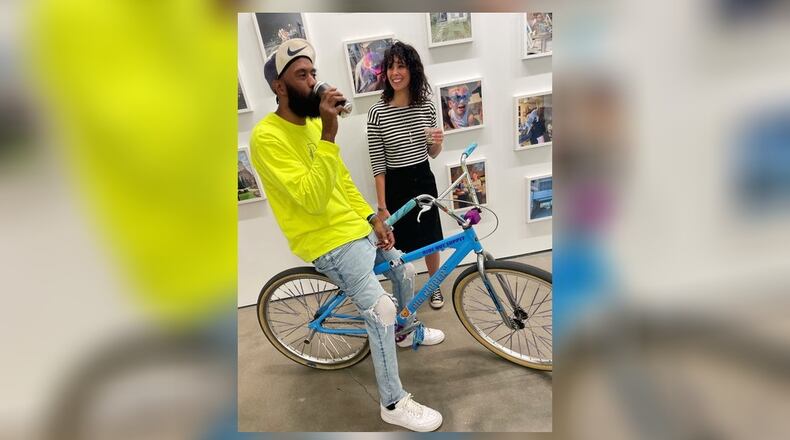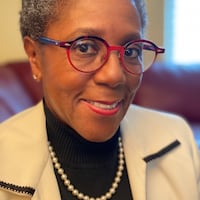She was so struck by the photos that she wanted others to view what she had seen. The result is her exhibit, “Amy Lynn Powell: Only let people who love you photograph you.”
The show, “Amy Powell: Only let people who love you photograph you.” is on exhibit through Dec. 24 at The Contemporary Dayton (The Co).
Powell talked to the Dayton Daily News about the show she curated from photographs posted to social media with #Dayton.
Question: How did you come up with the idea for this exhibit?
Answer: I didn’t really come up with an idea and think that I had a great idea. It was just something that I naturally did while viewing Instagram. So when Instagram first became a thing, I was just really fascinated...I could use different hashtags or search different locations and see how people lived in other parts of the world and that they were posting things you could see instantly what was going on so it provided a window into other people’s average everyday lives and I thought that it was really cool that I could see what they were doing. I just turned to Dayton because I thought, you know, Dayton has its own merits and values as a place.
Q: So after seeing other places, you wanted to see Dayton in that same way?
A: Yes. So Instagram allows you to save things that you like. So I just started seeing images in Dayton that I thought were funny or familiar or interesting, and I would just save them in my camera roll. And so it wasn’t really a project idea. But then, as I as they started to accumulate, I looked at them and I thought, wow! This, to me, looks like art, because I follow street photographers like Daniel Arnold, for instance in New York City and he does amazing street work in New York.
And I was frustrated that, you know, a lot of people view Ohio as a flyover state. I’m connected in a photography world and it’s like, people in the media, they only come here when there’s some sort of catastrophe to cover like the heroin epidemic, or the mass shooting. And if there was even a documentary film done, it would be entitled something like “Forgotten America,” and then feature Dayton. And I just think that the people here, to me, are inspiring. I just wanted to do a show for Dayton and because I thought that there was something here that was special.
Q: What do you think is special about Dayton?
A: You know, I moved to Dayton; it’ll be 10 years this summer. And I was excited to come to a new place. It felt like one of the first things that I noticed and was that the city had really low self-esteem, because I was excited to come here and a lot of the response that I got when I told people that I was new was ‘I’m sorry you had to come here, (as if moving to Dayton) was a bad thing.’ But the thing that I think is special is, I have felt very welcomed here. I have made a lot of friends here. I love how I can’t go anywhere and not see a familiar face. It feels like a family. But that doesn’t mean it doesn’t have its problems. I mean, Dayton has its problems. But it’s also very relaxed because I felt a lot of pressure living in Columbus and coming here it’s like, you don’t have to worry so much about being trendy, or it just feels like you can be yourself.
Q: You mentioned that you came from Columbus. What brought you to Dayton?
A: Actually, I met a guy in art school, and we are still really good friends. I followed him out here. And we decided to not be in a relationship anymore. But he’s an amazing guy. I’m actually really good friends with him and his girlfriend. And so it’s like I think people are surprised that I haven’t left Dayton since he and I split up in 2016. But it’s like it would be a hard sell to move because it’s just so super affordable. I have so many friends here. I felt really supported by the art community.
Q: Let’s talk a little bit about the photos you selected. What did you learn from your choices? What surprised you?
A: I think one of the things that I found really surprising is how much people are willing to share their pain. There was one guy’s account; I would say he was probably in his 70′s and he has a picture in the show, but it’s not of him. He had several selfies on his feed with long posts about just how lonely and how unhappy he was. And he posted photos of himself crying. So yeah, there were things that I saw there and I wasn’t opposed to showing; I didn’t select a picture of him crying for the show. But the expressions of pain and grief and loss, yeah (pause).
Q: What did you learn about yourself?
A: I mean, these are questions I haven’t even thought of so I have to think and ponder on that.
I think more than anything, it’s confirmed things what I already knew about myself because even from a very young age, I was a people watcher. I was very shy. I felt invisible. And I would sit and I would watch other families play. I would observe them and if we were at a campground, I would just sit on the roof of my mom and dad’s car, and I’d be like 5 years old, and I would just watch other people having parties and their family’s interactions. And so this is just another way of doing that. But, from the window of my phone.
I think one of the things that I’ve learned is I just have a strong curiosity of how the family dynamics (work) and just how people live their lives, how they choose to decorate their homes, and what they find to be valuable because what people choose to post online is something that they’re choosing to share. They want people to know, they want to be seen. And I think the thing that I’ve learned is, it’s like I just want to connect with people really, and this show is about wanting to connect with these people, wanting them to come, to see themselves in a new way. And see themselves in their photographs and like their expression as valuable and as something that is not looked down on, but is just treasured in a way. That’s why the frames are there. To be in a space like this, you need to have an image behind glass and in a frame to say that it is important.
Q: How has curating this show informed your work?
A: I think the biggest thing is that I want to collaborate. My previous work was all solo work. I took the photos, I did all the scanning, I worked at the computer, I did all the darkroom, I was completely alone. So I liked that this incorporates and works with the community and reaches out to people in the community. And then so yeah, I just want to do things that are more collaborative.
Q: What’s next?
A: I want to work on making a short documentary film this year. There is this HBO director that I worked with. She said that she was very happy with what I was able to do. And so she said she could get me work doing that kind of stuff, so I think I’m going to try to see what I can come up with and make my own film, short film. But I just don’t know what I want it to be about yet.
HOW TO GO:
What: “Only let people who love you photograph you” by Amy Lynn Powell; “Blind Spot” by Teju Cole and “Street” by James Nares.
Where: The Contemporary Dayton, 25 W. Fourth Street in the Dayton Arcade
When: Through Dec. 24. Gallery hours are 11 a.m. to 6 p.m. Wednesday through Saturday, 11 a.m. to 4 p.m. Sundays and First Fridays until 8 p.m.
Admission: Free
For more information: See www.codayton.org or call 937-224.3822
About the Author


